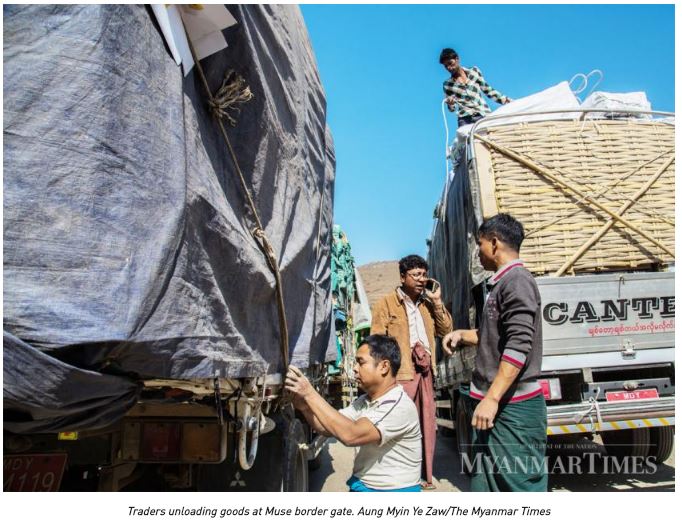Myanmar: Illegal trade more rampant than before, govt measures not effective
Government efforts to prevent illegal border trade have not been effective or sufficient and counterfeit goods are still being smuggled into the country. In fact, things are worse than before.
“Illegal trade can’t be controlled. Illegal trade is worse than before even though measures were taken to reopen some of the border gates by the higher authorities,” said U Min Aung, assistant director at the supervision and legal taxation team for the Shan border gates.
U Khin Maung Lwin, assistant secretary at the Ministry of Commerce, told The Myanmar Times that a variety of goods including illegal food, alcohol and electronics have been seized and confiscated at the border.
Last month for example, the Kayin State government confiscated large quantities of illegal betels from Indonesia. “Vehicles are able to find ways to cross the border without going through the border gates. Many of these are trucks transporting all kinds of untaxed or counterfeit goods. Some of them are caught and arrested, but we are not able to catch everyone,” U Khin Maung Lwin said.
Illegal trade disrupts economic growth because the goods escape taxes which the government would otherwise collect as revenue. As a result, traders are able to sell these goods for much cheaper prices than locally manufactured or legally imported products. For example, locally produced beer is taxed at a rate of 40 percent, yet illegal importers regularly get away with paying no tax at all.
‘Illegal trade is worse than before even though measures were taken to reopen some of the border gates by the higher authorities.’ – U Min Aung, Shan border gates team
Illegal routes
Currently, most vehicles enter Myanmar from Thailand, according to U Khin Maung Lwin. There are also many illegal trading routes at the Myanmar-China border along northern Shan State, such as the 105th Mile trading zone in Muse, according to customs officials.
Goods are also smuggled out of Myanmar into China via these illegal routes. Officials have seized local forestry products, livestock, minerals and gemstones in the past.
In southern Shan State for example, goods are illegally exported to China via the Naung Cho feeder road which passes through Tar Kaw Bridge in Taunggyi. In eastern Shan State, local products are being sent to China via Kyaingtong-Mine Yan and China products are also illegally imported.
Certain routes, such as the Mineyan-Minekhat road, are commonly used to smuggle beer and snacks into China and bring in textiles and electrical appliances. Similarly, traders are illegally exporting crops and wildlife to China and Thailand via Tarlay-Pasho-Kyinelat Road and illegally importing beer, artificial sweetening agents and other finished goods from the two countries.
Illegal goods are also passing through the Tar Lay-Kyainglat and Kyaingtong-Mine Lar roads in as well as the Mine Yaung-Mine Yu and Tachileik-Mine Phone routes near the border. Similar activities take place via Oo Zwe port and Wanpone port at Tachileik, according to official border gate statistics.
Although permission was given to import consumer goods through Tachileik Bridge (1), many are avoiding the route to evade a 3 percent tax levied on imports. Meanwhile, at Tachileik Bridge (2), which permits larger vehicles to pass across the border, a lack of government manpower has resulted in just five out of 20 vehicles transporting fuels being properly taxed.
Border control
For its part, the government has taken efforts, such as reopening the Yaypu and Mayanchaung inspection gates, to prevent illegal trade. The gates are handled by the customs department and special teams have been deployed in Kayin and Shan to check and confiscate all illegal goods
Those efforts have not been sufficient. According to U Min Aung, the amount could be at least double that of legal trade volumes, based on his estimates. Currently, no data on the exact volume of illegal trade taking place is available.
What should be done to control illegal trade? The way U Min Aung tells it, stricter government enforcement and coordination between departments can help to improve things.
He said the main reason illegal trade is still taking place is that civil employees are not coordinating their work properly and corruption is rampant. For example, even though the government has prohibited the selling of timber at the border and only approved trade via sea routes, timber is nevertheless being illegally exported at the border areas in Kachin and Shan.
“The Ministry of Commerce has given authority to one department to inspect and seize illegal goods. The responsibility of checking for illegal trade at the border lies in the hands of the inspection group. However, other departments are not cooperative or concerned. Instead of cooperating, the departments are competing against one another for the right to carry out various responsibilities so in the long-term there can be no development,” said U Min Aung.
He added that “in order to promote trade in the economy, one department’s directive, instruction, and law must be followed and respected by other departments.”
In addition, the government should also be inspecting and preventing the sale of prohibited or illegal products within the local market, but there is no such process taking place in Myanmar for now. For example, there are numerous illegal trucks in Yangon, Mandalay, Sagaing, Magwe Regions, Shan, Kayin and Mon States. And although imported alcohol and beer is restricted in Myanmar, foreign liquor can be found in shops and supermarkets of every township.
“If the government enforces the confiscation and collects taxes or fines on illegal goods in the local market, they can both raise tax revenues and help eradicate illegal trade,” U Min Aung said.
Source: https://www.mmtimes.com/news/illegal-trade-more-rampant-govt-measures-not-effective.html


 English
English




